Seventy-five years ago today the European Convention on Human Rights was signed in Rome by the 12 states, including Britain, that then formed the Council of Europe. There will be official celebrations: in Strasbourg tonight, a solemn ceremony of speeches and a gala classical concert at the Opéra national du Rhin, and in London next month a formal lecture by our recently-retired man in Strasbourg followed by a Foreign Office reception. But one thing is very noticeable: beyond the great, the good and the earnest (such as the human rights bar and organisations like Amnesty and Liberty), few care. Most of the public, and for that matter most of our politicians, will blithely ignore the whole caboodle.
The ECHR today presents more of a problem to be solved than an institution to celebrate
Human rights enthusiasts will blame ignorance, and say that that given adequate education about the ECHR it could attract the kind of spontaneous enthusiasm here that Americans show for their constitution and the French for, say, Bastille Day. If only. The ECHR today presents more of a problem to be solved than an institution to celebrate.
It is actually the changes since we signed that present the real difficulty. As passed, the original ECHR was unexciting, but also uncontroversial. Twelve states agreed by treaty to observe a list of rights, ranging from life to freedom of speech and religion, closely connected to avoiding the excesses of Nazism and fascism. Absolutely egregious state conduct aside (Franco’s Spain and Salazar’s Portugal providing uncomfortable examples), everyone assumed democratic government would be largely unaffected. Enforcement would, it was envisaged, consist largely of moral state pressure; litigation would be a very last resort, and direct legal complaints by individuals highly exceptional (they were only allowed if states specifically opted in).
There was, we decided, little danger in signing up to something this anodyne; and indeed, had things remained as they were we would have been right. But they did not. At the centre of the human rights structure now stands, not political suasion, but a legalistic and imperious Strasbourg court which expects its judgments to be obeyed without question. Individual complaints take up nearly all the court’s time. Far from seeing its remit as limited to calling out state conduct unacceptable in any civilised polity, it now more and more sees the ECHR as a kind of de facto constitutional bill of rights a bit like that in the US. A bill of rights of an odd sort, mind you: despite the fact that elected governments now find themselves noticeably limited by it, unlike most constitutions it has almost no popular or democratic legitimacy. Democratic politicians’ impatience is understandable.
But the problems go further. Since about 1980 the Strasbourg court has described the ECHR as a ‘living instrument’, an innocuous but dangerous phrase indicating that the specific rights listed in it should be useful hooks on which to hang imaginative interpretations. The right to life, for example, once limited to state death squads and the like, now covers numerous cases of state failure to prevent threats to life from those unconnected with it. The Article 8 right to a private life goes even further. It now severely constrains what states can allow newspapers to publish about people, and requires laws criminalising hate speech. Most recently it has ballooned yet further: even though the ECHR says nothing at all about the environment, Switzerland was told last year that Article 8 required laws about climate change. Most recently Norway was informed about bureaucratic hoops it had to put in the way of oil exploration offshore. A far cry, one might say, from the more prosaic days of 1950.
This, moreover, is quite independent of voters’ views. In the Swiss case it made no difference that the climate law had been put to a referendum and expressly rejected: if anything the court thought this made intervention more important, not less. Such diversions around democracy may be acceptable in outrageous cases like state torture or murder: in situations like this it comes close to a demand that the judgments of an elite and unaccountable intellectual class trump democracy itself.
If all this had overall led to a spread of decent and liberal regimes, we might grudgingly accept it. But even this is not clear. Russia invaded Ukraine and squashed dissent at home when a member of the ECHR; Turkey and Azerbaijan, both also members, have distinctly unsavoury records. And there are plenty of countries that remain impeccably liberal despite non-membership of anything like the ECHR: think Australia, Canada and Japan. I know where I’d prefer to live.
If you still want to raise a glass of prosecco tonight that’s your right. But you might find your celebration remarkably hollow.







Comments